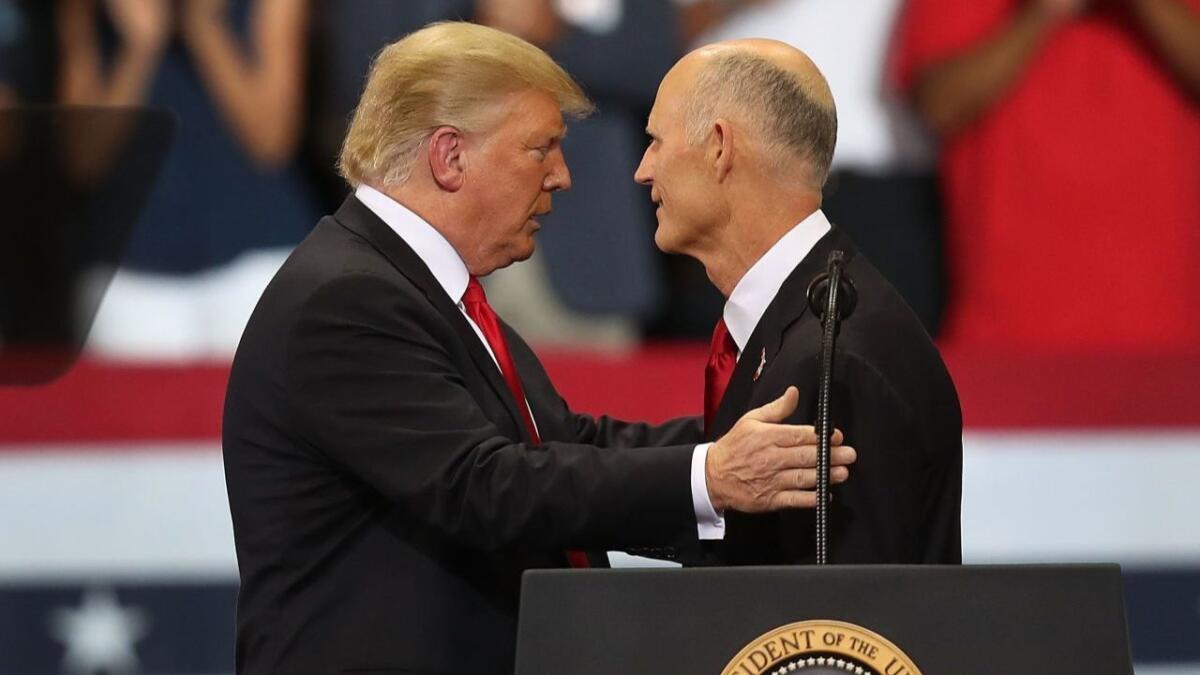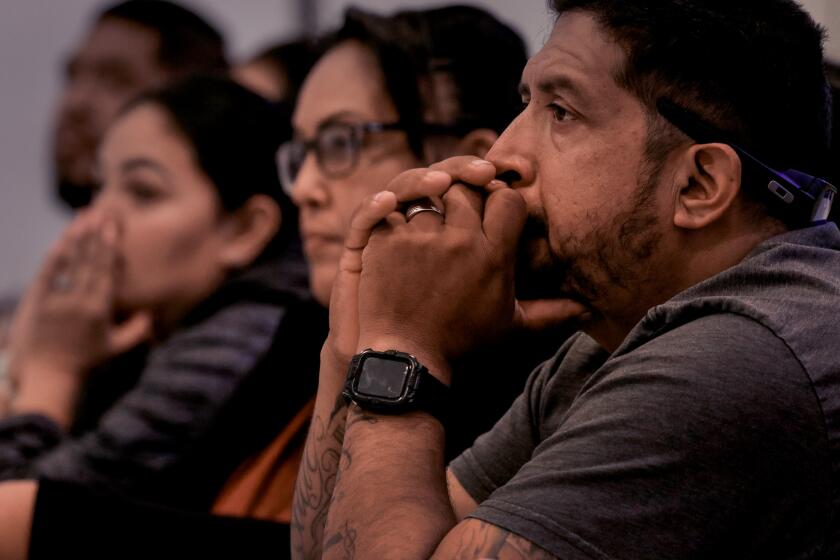Trump calls to end recounts in Florida’s Senate and governor elections, and alleges fraud without evidence

Reporting from Washington — As vote counts in several states increased Democrats’ midterm election gains and further undercut President Trump’s claims to victory, the president on Monday led some Republicans in alleging vote fraud, especially in Florida, without evidence.
In a morning tweet, Trump called for a halt to recounts in Florida, where Republicans’ leads in Senate and governor races have eroded as outstanding votes are tallied. He said election-night results should hold, a move that would disenfranchise absentee, mail-in, provisional, overseas and military voters.
Later in the day, Republicans lost a Senate seat they had hoped to gain when Rep. Martha McSally conceded the election in Arizona to the Democratic candidate, Rep. Kyrsten Sinema. McSally had led on election night, but she fell behind as state officials counted tens of thousands of vote-by-mail ballots that had not yet been tallied.
By his allegations about wrongdoing, Trump contradicted Florida election officials, who stated that they’d seen no evidence of criminal conduct. Florida’s secretary of state in charge of elections is a Republican appointee.
A recount is required by Florida law if the candidates’ vote totals are within a half-percentage point of each other. Meanwhile, ballots from overseas and military voters have until Friday to arrive to be counted.
The president’s complaints, which he also raised about undecided elections in Arizona and Georgia in recent days, recalled his preelection threats two years ago to allege fraud if he lost the presidential contest. They also suggest a harbinger of what could happen as he seeks reelection in 2020.
The protracted fights over Senate and governor elections in Florida and Georgia come as Republicans have seen their election-night leads narrow or evaporate in other states as well, including California — solidifying evidence that a “blue wave” did materialize for the Democratic Party.
The number of Democrats declared winners of House contests has increased from an estimated net gain close to 30 a week ago to as many as 40; Democrats needed 23 seats more to capture the majority.
Trump, in his tweet, focused on Florida, the state where he maintains a home, and where he campaigned hard for the Republicans’ Senate and gubernatorial candidates.
“The Florida Election should be called in favor of Rick Scott and Ron DeSantis in that large numbers of new ballots showed up out of nowhere, and many ballots are missing or forged,” Trump wrote. “An honest vote count is no longer possible-ballots massively infected. Must go with Election Night!”
Scott, Florida’s governor, is the Republican candidate for the Senate and is slightly ahead of Democratic Sen. Bill Nelson. DeSantis is the Republican gubernatorial candidate, who has a small lead over Democrat Andrew Gillum.
Later Monday, the Republican National Committee sent out a fundraising plea -- described as coming from “Trump Headquarters” — imploring supporters not to “let the corrupt Democrats of Broward County steal our election victories.”
It’s no surprise the president prefers the electoral picture as it appeared on election night, when both Scott and DeSantis seemed to have won narrowly in Florida. Both men are still seen as having an edge, given the size of their current leads, raising questions about why Trump decided to inject himself into the Florida fight.
While Scott and Republican Sen. Marco Rubio also have been crying foul in Florida, Republican leaders in Arizona from the governor on down did not do so. McSally initially led Sinema by 1.5 percentage points, but by Monday night had fallen behind by about 1.7 points, or about 38,000 votes.
Even with votes yet to be counted across the country, the snapshot of the national electorate that’s emerged is one with warning signs for the president as he considers his 2020 prospects. Most notably, no Republicans won statewide races in Pennsylvania, Wisconsin and Michigan, the three states in which Trump’s hair-thin wins in 2016 made possible his stunning electoral college victory.
Overall, 115 million Americans voted in the midterm elections, a 32% increase from the previous midterm elections in 2014. The national turnout rate, 49% of eligible voters, is the highest in more than a century, since 1914, according to Michael McDonald, an associate professor at the University of Florida who analyzes voter turnout. Democrats gained significantly among women and both younger voters and those 65 and older.
Trump had been quick to frame the election as a triumph for Republicans — himself in particular. He told reporters at a White House news conference on Wednesday that his “vigorous campaigning stopped the blue wave that they talked about,” and he bragged, prematurely, that the election had resulted in “the largest Senate gains for a president’s party in a first midterm election since at least President Kennedy’s in 1962.”
The president acknowledged that some Senate races were still hanging in the balance, but marveled at the best-case scenario for his party: “Fifty-five is the largest number of Republican senators in the last 100 years.” His party will now hold, at best, 53 Senate seats, if Scott holds onto his lead in Florida and Republicans win a runoff election in Mississippi, as is widely expected.
A statewide recount in Florida, triggered by the narrow margins in the two top-of-ballot contests, as well as for state agriculture commissioner, began on Sunday. Officials are racing against the clock to finish recounts by machine ahead of a Thursday deadline. Hand recounts could follow.
That looks more likely in the Senate race between Scott and Nelson. Scott has seen his cushion narrow to 12,562 votes out of more than 8 million ballots cast statewide — a 0.15% margin — according to the state’s unofficial count as of Saturday.
In the governor’s race, DeSantis, the Trump-backed Republican, is ahead of Gillum, the mayor of Tallahassee, by 0.41 percentage point. If that margin holds, there won’t be a hand recount, which would occur only if the difference is smaller than 0.25 percentage point of the overall vote.
Scott on Sunday accused Nelson and Democrats of trying to “commit fraud to try to win this election.” Scott’s campaign has filed lawsuits against election supervisors in Broward and Palm Beach counties, two Democratic strongholds where officials have been slower to process ballots.
At an emergency hearing Monday in Broward County, a judge emphasized the lack of evidence of wrongdoing and urged all sides to “ramp down the rhetoric” to avoid undermining citizens’ trust in elections.
Florida law allows county clerks up to 10 days after election day to count ballots received that day, and those that trickle in after.
Steve Schale, a Democratic operative and blogger in the state, cited Pinellas County, which includes St. Petersburg, where 20,000 ballots arrived just on election day.
“That’s why the law provides the window until 10 days after for people to reconcile those absentees,” he wrote. “Despite all the controversy and uncertainty, the process is actually working like it’s supposed to. 8.2 million ballots aren’t going to get counted overnight.”
Nelson’s campaign has also sued in state court, in an effort to force the state to re-examine absentee and provisional ballots thrown out because of signatures that didn’t match voter files. A judge is set to hear that case this week.
In Georgia, Republican Brian Kemp and Democrat Stacey Abrams also remained locked in a bitterly disputed gubernatorial race.
With 3.9 million votes cast and Abrams trailing Kemp by about 58,000 votes, Kemp has declared victory. The Abrams campaign said on Monday that after counting provisional and absentee ballots from several counties, Abrams needed just 20,893 votes to qualify for a runoff and 18,555 votes for a recount.
“This race is not over. It is still too close to call,” Abrams’ campaign manager, Lauren Groh-Wargo, told reporters on Sunday, noting that thousands of voters had questions about their absentee and provisional ballots.
Late Sunday, the Democratic Party of Georgia and Abrams’ campaign filed a federal lawsuit against the secretary of state — Kemp — and the elections boards in two populous Atlanta-area counties. Their suit asks the court to require the counties to accept absentee ballots that were “arbitrarily” and “unlawfully” rejected and to accept provisional ballots that were rejected because the voters live in a different county.
Kemp’s team, meanwhile, kept up its pressure on Abrams to concede, saying it was mathematically impossible for her to force a runoff.
“Stacey Abrams and her radical backers have moved from desperation to delusion,” said Ryan Mahoney, Kemp’s communications director, in a statement Monday. He added, “They don’t want to win this election. They are trying to steal it.”
Jarvie reported from Atlanta.
UPDATES:
5:10 p.m.: This article was updated with McSally conceding the race in Arizona.
2:10 p.m.: This article was updated with reporting and context, including an update on the Georgia gubernatorial vote, a Republican National Committee fundraising petition, data on voter participation in the midterm elections, a Florida judge’s admonition about partisan rhetoric, and a quote from blogger Steve Schale.
This article was originally published at 8:05 a.m.
More to Read
Get the L.A. Times Politics newsletter
Deeply reported insights into legislation, politics and policy from Sacramento, Washington and beyond. In your inbox three times per week.
You may occasionally receive promotional content from the Los Angeles Times.












